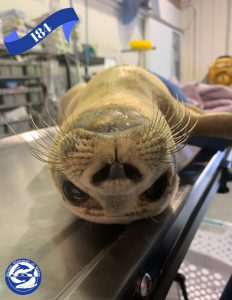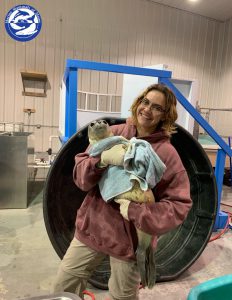By Katrina Rossos
University of Florida senior Sarah Teman said there was no precise moment when she fell in love with wildlife, but the self-proclaimed bookworm ventured to guess that the inspiration came from reading.
“The Barnes and Noble nature section was a cheap babysitter, and my parents supported my addiction by buying me field guides to places I’d obviously never been as a child because I wanted to look at the pictures,” Teman said. “In that way, wildlife was always fascinating, and my interest in ecology probably stemmed from my favorite question ‘why’ as a kid.”
By the time Teman was in middle school, she launched her first two ecological experiments—both of which failed. She looked at how sediment pollution affected water flea behavior and if the circadian rhythm of dinoflagellate Pyrocystis noctiluca affected bioluminescence. Both experiments were inconclusive because frankly she couldn’t see the transparent plankton in dirty water and her pre-purchased dinoflagellate never illuminated.

Despite the failed experiments, Teman was not discouraged from pursuing ecology. She is currently interested in answering questions related to population ecology, local and broad-scale ecosystem dynamics, and factors contributing to ecological processes, but she is particularly fascinated by marine mammals.
“My perfect life is pursuing these research interests with questions about cetaceans (whales, dolphins, and porpoises), and contributing to conservation,” Teman said.
Teman was able to spend this past summer with marine mammals in Maine as she served as an intern at Marine Mammals of Maine (MMoME), located on the peninsula of Harpswell in the pine tree state. MMoME responds to sea turtle and marine mammals over 2,500 miles of Maine’s coast and serves as a triage and rehabilitation center for marine mammals.

At the center, Teman’s internship opportunities ranged from stranding response, in-house patient care, necropsy, education and outreach, and data management. “A typical day at the center is a permutation of any, and sometimes all, of those tasks, with patient care as a constant,” she explained.
The number one animal in which they responded were harbor seals along the coast. Teman helped the facility’s staff perform health assessments on both live and deceased seals in the field.
“Response doesn’t always mean collection, and we often monitor healthy individuals or relocate those that are at risk of human interaction. We bring seals back to the center for medical treatment provided there is a slot available to them for long-term rehabilitation at any of the facilities within the northeast stranding network,” Teman said.
The only triage center for seals on the east coast, MMoME serves as an emergency room for seals. The center works to stabilize critically injured seals for up to 96 hours before transporting them to the next center, which is located about 250 miles away, according to Teman.
“In addition to triage, MMoME is permitted to house four long-term rehabilitation patients, and all four spots are currently filled,” Teman said. “These individuals were collected as abandoned pups and sick weanlings and have made huge strides in their health and weight since admit.”
Assisting with necropsies was another aspect of the internship in which Teman participated. In 2018, NOAA declared an unusual mortality event (UME) for pinnipeds from Maine to Virginia; this UME is still occurring. Starting in July 2018, death rates of harbor and gray seals have been elevated and the number of ice seal strandings, including harp and hooded seals, have risen since the 2019 winter.
“The cause of the UME is phocine distemper virus (PDV), a non-zoonotic virus (not transmittable to humans) that causes respiratory, neurologic, and multisystemic disease in seals,” clarified Teman. “We performed necropsies to determine cause of death and to collect histological samples, which test for PDV and help us understand overall population health.”
The most memorable event during the summer internship for Teman occurred on her last day. One of the intensive care rehabilitation patients, who had been admitted to the facility three weeks earlier, was not eating fish on her own. Teman said the seal was a weanling, meaning that if she was in the wild she would have been eating fish on her own. However, she was admitted to MMoME for a respiratory disorder and was tube-fed gruel and force-fed whole fish several times daily.
“During one of her twice-daily baths, we presented her whole fish and fish chunks to gauge her interest. She spent 10 minutes playing with the fish, which is normal for her. Finally, right before I was about to take her out of the bath for her nebulizer treatment, she shocked us all by slurping the fish up! We were ecstatic. We were so proud,” Teman exclaimed.
“This internship showed me how important individuals are in understanding populations. We can learn so much from animal care and rehabilitation, including life history, genetics, histology, pathology, and behavior,” she said. “They all had their unique personalities and quirks! Each animal was a different and challenging case. Not all were easy, but all were worth it.”
Check out Teman rescuing a stranded seal here:
https://www.facebook.com/MarineMammalsofME/videos/509642046508303/
 0
0
